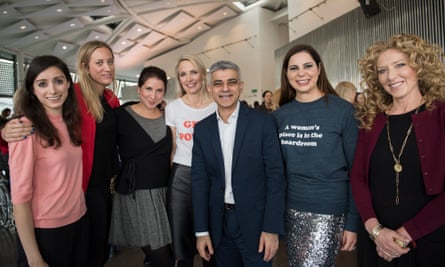“You can’t expect a young girl on a council estate in south-east London to be the next Kelly Hoppen without the access to finance, ideas, mentoring,” said Sadiq Khan, London’s mayor, at an International Women’s Day event at City Hall, organised by women-focused funding network and platform, AllBright.
In his keynote speech on Wednesday, Khan said his aim was to make London “the best city in the world to be a woman in business”. The Guardian Small Business Network asked how he planned to do that. His majority women business advisory board – 10 out of 16 members – was key, he said.
“As the mayor, I’ve got access to people with finance, and I’ve got to make sure it is in their interest to be tapping up young people with great ideas,” he added. Young women, in particular, he said, can feel there are not enough female role models in business. “Part of what we can do in the office of the mayor is to promote role models, is to encourage people to be aspirational, to be ambitious,” said Khan.
He explained one way he planned to do this is through Skills for Londoners, a taskforce the mayor’s office is setting up to help businesses and Londoners get the skills they need.

“I want to make sure Skills for Londoners taps up chief executives, entrepreneurs, successful women, to go to [speak at] assemblies at schools and further education colleges across London, to make them realise they can do anything, subject to being given a helping hand.”
Skills for Londoners, he said, could provide that girl on a London council estate with the resources to become a successful entrepreneur. “It’s a virtuous circle [...] we all benefit from young Londoners whose potential is untapped having their potential [realised].”
At the start of the event, Debbie Wosskow, co-founder of AllBright and a member of Khan’s business advisory board, emphasised that the representation of, and investment in, women-led businesses is still far behind that of men. She pointed to the fact that only 10% of global venture capital funds are awarded to women in business. Moreover, in the UK just 14% (pdf) of angel investors are female.
While men still dominate the investment scene, they hold the power and need to be reminded of the value of women’s representation in businesses. Wosskow pointed out that companies with more women on their boards have been shown to deliver a 36% better return on investment.
At the AllBright event, Khan spoke to a room of mostly women. Such events, while positive for celebrating and supporting women, can either, by nature, exclude or not appeal to men. How can men be brought into the conversation, the Guardian Small Business network asked Khan. He said he thinks (most) men do know women’s value in business, but everyone, women included, still needs to be thoroughly convinced. “I’ve always argued that it [gender equality] is a moral case, social case, but actually there is an economic case,” he added.
With London providing roughly a quarter of the country’s economic output, and a fifth of its taxes, he said, imagine what its output would be if the business potential of its women was fully realised.
Will we always need an International Women’s Day? Khan said: “We’re at a crossroads, so my frustration in years past was that we are only inching forward [towards gender equality]. But I think, for the first time ever in my adult lifetime, we’re in danger of [...] some of the process being reversed, with the rise of populist moments, with the fact that if you are a woman that puts her head above the parapet on social media you have threats made against you, the fact that we have some of the language [we do] being used by leaders of countries. I’m afraid, for the foreseeable future, we will continue to need International Women’s day, to get gender equality.”
Sign up to become a member of the Guardian Small Business Network here for more advice, insight and best practice direct to your inbox.

Comments (…)
Sign in or create your Guardian account to join the discussion